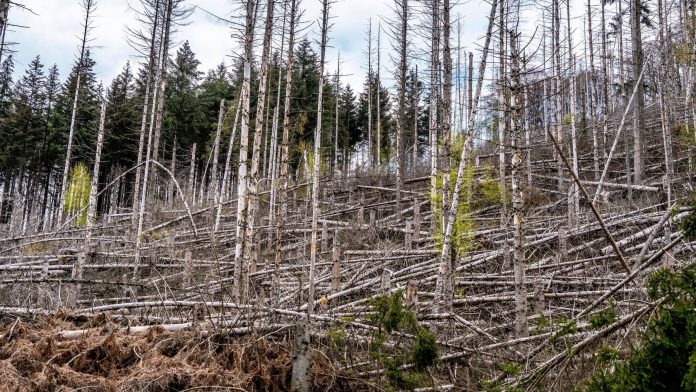The forests have already been infested by the beetle in recent years. This time it could hit the trees again. The reason for this is climate change.
A new wave of bark beetles could roll towards German forests. The winter was very pleasant for the pest, so that too many animals survived, said the head of the Julius Kühn Institute for Forest Protection, founded in December, Henrik Hartmann, the German Press Agency. “As in previous years, it was too warm and dry.” As a result, spruces are threatened again. In the long term, other tree species are also at risk from climate change.
Precise figures on forest damage in Germany have so far only been available at state level. “We are currently working on setting up a nationwide database,” said Hartmann. In addition to insect infestation, this should also record fire or storm damage in forests. According to the expert, the situation can already be assessed well without this data.
“After a somewhat weakened momentum last year, we are now heading back to the level of 2021,” said Hartmann. According to current data from the Federal Statistical Office, insect damage was the cause of 60 percent of the logging caused by forest damage last year. In 2021, the statisticians reported the record value of 81 percent.
The bark beetle infestation is increasing rapidly
In cool April, the insects were still holding back, but from May they spread widely, said Hartmann. The forestry research institute in Baden-Württemberg also warned at the end of June that the infestation was increasing rapidly and in some regions was twice as high as last year.
The President of the Association of German Forest Owners, Andreas Bitter, says: “The situation is currently extremely critical.” The parent generation of the beetles is currently at work, which have overwintered, and their offspring are yet to follow.
The main problem: Due to the high temperatures and, above all, the drought, up to three generations of the pest beetles would hatch in one year, says Hartmann. The bark beetle is actually good for the forest and takes care of deadwood, which is important for the development of animals and plants – just not in the current amount.
The problem is climate change
According to Hartmann, the spread of the bark beetle has been epidemic in many regions of Germany since 2018. He emphasizes: “This is clearly attributable to the climate.” So far, the main focus has been on the so-called book printer. This bark beetle species mainly attacks spruce trees.
The little animals bore into the trees and lay their eggs under the bark. After hatching, the larvae feed on the bast layer of the tree. This thin layer under the bark is the tree’s vital vascular system. It transports water and nutrients. If the layer is destroyed, the tree dies.
The shallow-rooted trees have been weakened by the severe drought in recent years and are susceptible to beetle infestation. Strong storms also knocked down many trees. The beetles nested in this deadwood.
The bark beetle is persistent
According to experts, the bark beetle can hardly be stopped, especially at lower altitudes. There are not enough workers and machines for that. In addition, the procedure is expensive: due to the urgency, the felling of infested trees costs more money and at the same time the proceeds for the damaged wood are lower. And: Even if infested trees were felled in good time and transported out of the forest, beetles would still remain in the leaf layer in the forest.
The beetle has so far spread more slowly at higher altitudes because of the cooler temperatures. That seems to be changing now, says forest owner representative Bitter. In addition to spruces, pines would also be increasingly attacked.
In the future, global warming could affect other tree species, says Hartmann. “We are slowly moving outside of ideal conditions for trees that we have previously considered native.”
The forests need to be reforested
In Germany, low mountain ranges in particular have been affected by the bark beetle. According to the Lower Saxony state forests in the Harz Mountains, around 80 percent of the spruce trees have fallen victim to the pest in the past six years. The region is one of the most affected regions with the Sauerland.


